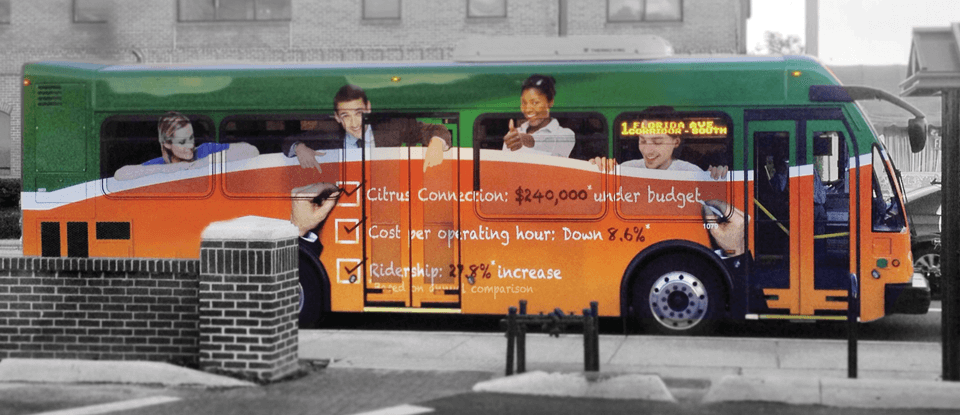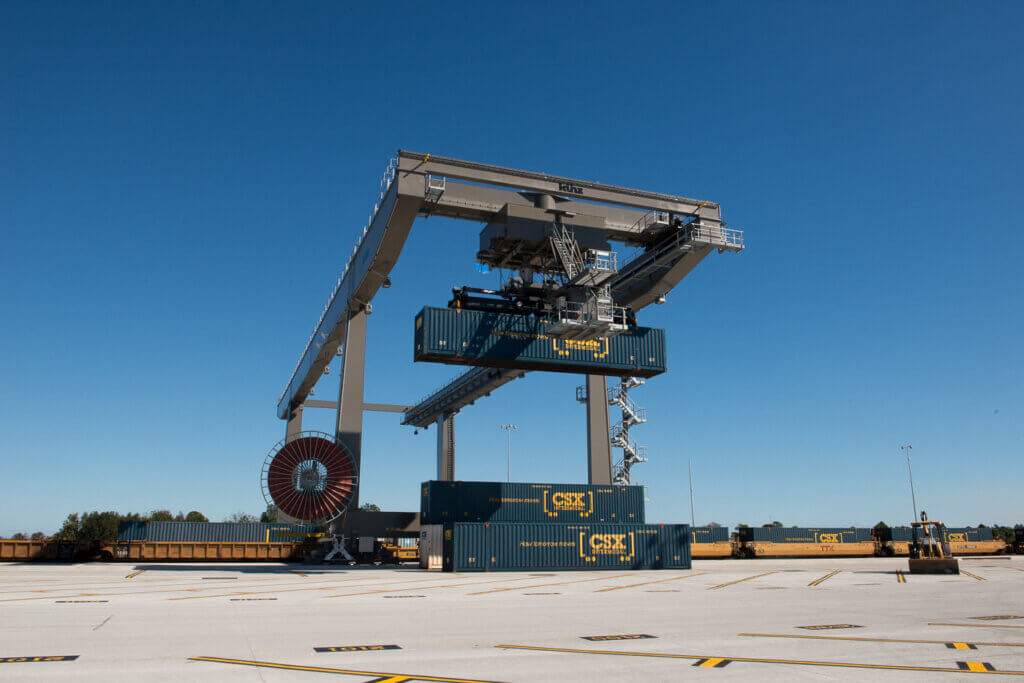Catching Up with the Bus: Mass Transit in Polk County
As Polk County continues to grow, so does the need for a mass transit system that can transport people where they need to go while also reducing traffic on already crowded roads.
The county and its 17 municipalities look to Tom Phillips, Executive Director of Citrus Connection, to keep track of the day-to-day operations while also looking forward to what’s coming down the line.
“Tom is a visionary and does an excellent job communicating the benefits of achieving an effective transit system in Polk County and the Central Florida region,” said Polk County Manager Jim Freeman. “Tom provided strong leadership to achieve the goal of operating one seamless transit system in Polk County.”
Phillips moved to Lakeland in 2011 when the Lakeland Area Mass Transit District, generally known as Citrus Connection, lured him from the Pace Suburban Bus in Chicago. Under Phillips’ leadership, the Citrus Connection merged with all other county transit systems, providing a unified approach to public transportation.
He also helped the Citrus Connection move past internal problems, increase ridership and reduce costs, all of which are critical to meet the needs of a growing county.
“As the county moves toward a million in population over the next 20 years, mass transit will be an even more important part of the county’s overall transportation system,” Freeman said. Without it, “Vulnerable county citizens would have more difficulty getting to employment and essential services like medical care.”
The Central Florida Development Council asked Phillips to answer a few questions on public transit now — and in the future.
CFDC: What does Mass Transit offer the various cities in the county?
Phillips: Public transportation transforms the communities of Polk County and the lives of the people living in them by spurring economic development, promoting sustainable lifestyles and providing a higher quality of life. Every segment of our local society — individuals, families, communities and businesses — benefits from the service we provide.
On any given bus, it could be a mom taking her young child to a doctor’s appointment, a commuter going to work at the Polk County Courthouse in Bartow, a high school student going to school or even a daughter going to visit her father in an assisted-living facility.
People in each of the 17 municipalities and the unincorporated areas of the county travel to meet their needs (to go to work, to shop and to get to essential services like medical appointments); for personal development (to go to high school or college); and for entertainment (to participate in or watch sporting events or to visit friends and family).
Mass transit connects people with all communities and everything those communities have to offer. It also provides critical mobility and independence to those who need it most. It affords everyone an opportunity to participate in life beyond the walls of their home.
CFDC: What about local businesses? Please explain the relationships with the likes of Legoland and Polk State College, as examples.
Phillips: Public transit carries customers, employees and students to businesses and education opportunities throughout Polk County. To name just a few, our popular routes serve the medical corridor in Lakeland, the Cypress Gardens Boulevard corridor in Winter Haven, the county buildings in Bartow and the Polk State College campuses.
Businesses, colleges, schools and organizations recognize the importance of public transportation by entering into Universal Access agreements with us, where businesses and educational institutions pay a flat rate to subsidize transit for their employees, students or clients.
For example, LEGOLAND Florida provides much-needed transportation access to the model citizens employed at LEGOLAND through a Universal Access Program. This is the first of its kind in the country with a Fortune 500 company.
Universal Access Programs started with the forward thinking of Citrus Connection and Polk State College. All teachers, students and staff can show their student ID badge to the operator and ride free. This program has grown for Polk State and has earned the college the distinction of being designated Best Workplace for Commuters.
There are more than a dozen Universal Access Programs, including Southeastern University, Pace Center for Girls, Polk County Schools and Peace River. Citrus Connection is also proud of our partnership with the Polk County Board of County Commissioners for subsidizing free transportation for veterans through a Universal Access Program.
CFDC: How are ridership numbers on regular bus routes? What about specialty buses that pick up disabled riders, etc.?
Phillips: Our fixed route service in Lakeland, Winter Haven and the rural areas provided 1,252,509 rides in fiscal year 2016-17, which was slightly down from the 1,304,808 in 2015-16.
As the Community Transportation Coordinator for Polk County, Citrus Connection provided 21,024 Transportation Disadvantaged trips in 2017, up from 17,167 in 2016. In 2017, we provided 56,484 American with Disabilities Act trips, up from 54,061 the previous year.
CFDC: How is the move to get all cities up to their 20 percent share going?
Phillips: We have worked diligently with the municipalities we serve on their respective “Fair Share” agreements to assist in funding the service that runs in their communities. Currently, all of our partners are on board to subsidize their service except for Eagle Lake. We are hopeful Eagle Lake elected officials will realize the value of public transit for their residents.
CFDC: You’re always looking ahead. What’s next on the mass-transit horizon?
Phillips: We are watching the trends, and public transit partnerships with Uber and Lyft have begun. Many U.S. cities are teaming up with ride-hailing companies to provide on-demand public transit, as well as so-called first- and last-mile connections to transit services. With the vast size of Polk County, this is an option that can be a huge benefit to our riders and our service. These offerings appeal to riders’ desire for individual flexibility. By connecting ride-hailing apps with public buses, cities can help residents seamlessly move from one form of transportation to another.
Autonomous, or self-driving, cars are no longer science-fiction. They are coming, and they will be here much sooner than you might think. So while the idea of self-driving cars is quickly becoming a reality, the eventual effect on society and public transportation remains to be seen.
The reality is that autonomous vehicles are most likely not going to change public transportation all that much. For starters, public transit routes carry hundreds of people in each direction every day, something that would likely be impossible using autonomous vehicles without creating gridlock. This is something we will be keeping an eye on very closely.
In June, we introduced our first Smart Bus, which now provides an area to charge electronic devices. We will convert more buses in our fleet and will do the conversion on all new buses as they come in. We are considering the logistics in providing a charging station at our terminals.



